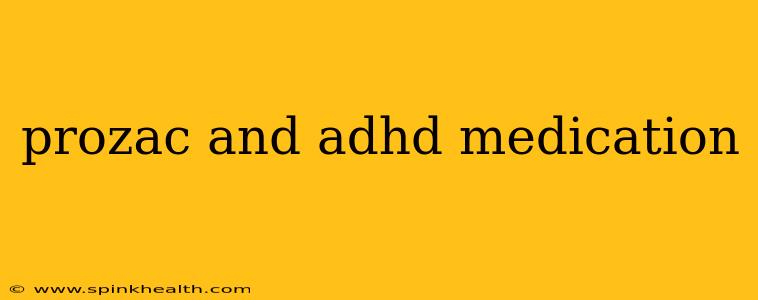The intersection of Prozac (fluoxetine), an SSRI antidepressant, and ADHD medication can be a complex one. Many individuals face the challenge of managing both depression and ADHD, often requiring a combination of medications to effectively treat both conditions. This isn't a simple case of adding one medication to another, however. Understanding the interplay between these two types of medication is crucial for both patients and healthcare professionals.
Let's embark on a journey to unravel the complexities surrounding Prozac and ADHD medication, addressing common questions and concerns. Imagine yourself as a detective investigating a medical mystery – we’ll piece together the clues to understand this intricate relationship.
Can you take Prozac and ADHD medication together?
This is a question that requires a resounding "maybe." The short answer is yes, it's possible and often necessary for those diagnosed with both depression and ADHD. However, the crucial detail is how this combination is managed. The specific medications, dosages, and monitoring are all critical factors determined by a psychiatrist or other qualified healthcare professional. They meticulously weigh the potential benefits against the potential risks, tailoring the treatment plan to the individual's unique needs and circumstances. A crucial aspect of this process is careful monitoring for potential interactions and side effects. This isn't a one-size-fits-all scenario; it's a personalized medical journey.
Does Prozac affect ADHD medication?
Yes, there's a potential for interaction. While some individuals find that Prozac complements their ADHD medication, others experience changes in the effectiveness or side effects of their ADHD treatment. Prozac can, in some cases, either increase or decrease the effectiveness of ADHD medication, depending on the specific drugs involved and the individual's response. This necessitates close observation and potentially adjustments to medication dosages under the guidance of a medical professional. It's like adjusting the dials on a finely tuned instrument – achieving the perfect balance requires careful attention and expertise.
What are the side effects of taking Prozac and ADHD medication together?
This is where things can get tricky. The side effects are not simply the sum of each medication's individual side effects. Combining the medications can potentially lead to new or amplified side effects. Some potential side effects might include increased anxiety, insomnia, gastrointestinal issues, or changes in appetite. Furthermore, the interaction between the two medications can vary greatly depending on the individual, highlighting the importance of personalized medical care. Always discuss any concerns or observed side effects with your doctor promptly.
What are the common side effects of Prozac?
Prozac, like other SSRIs, has a range of potential side effects. These can include nausea, headaches, drowsiness, sexual dysfunction, weight changes, and anxiety. The severity and frequency of these side effects vary significantly between individuals.
What are the common side effects of ADHD medication?
ADHD medications, whether stimulants or non-stimulants, also carry their own set of potential side effects. These can include decreased appetite, insomnia, increased heart rate, headaches, and mood changes. Again, the impact of these side effects varies from person to person.
Can Prozac help with ADHD symptoms?
While Prozac is not a treatment for ADHD itself, it can indirectly help with certain symptoms. For individuals with co-occurring depression and ADHD, treating the depression with Prozac may lead to improvements in some ADHD-related symptoms like inattention or emotional dysregulation. However, this isn't a substitute for dedicated ADHD treatment.
Is it safe to stop taking Prozac and ADHD medication abruptly?
Absolutely not. Stopping either medication abruptly can lead to serious withdrawal symptoms, including anxiety, irritability, nausea, and even more severe issues. Always consult your doctor or psychiatrist before making any changes to your medication regimen. They will help you gradually reduce your dosage to minimize withdrawal effects. This is a critical step to ensure a safe and controlled transition.
Disclaimer: This information is for educational purposes only and does not constitute medical advice. Always consult with a qualified healthcare professional before starting, stopping, or changing any medication. They can accurately assess your individual needs and develop a safe and effective treatment plan.

